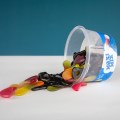

A food manufacturer approached SFA Packaging wanting a sustainable alternative to their glass packaging, because of its disadvantages. Glass has high CO2 emissions due to its energy-intensive production process. It’s also fragile, which results in greater risks during transport and higher costs. And because glass isn’t stackable, it takes up more space, increasing transport costs further. So the question was: how do we develop lighter, sustainable packaging that protects the contents as well as glass does?
The Project Approach
At SFA Packaging, we started with a thorough analysis of the customer’s requirements and wishes. We looked at material selection, production techniques and logistics benefits. Our aim was to find the right thickness for the plastic containers, balancing weight and protection. To safeguard the shelf life of the product, we carried out extensive tests, to make sure the containers block light and oxygen effectively.
We also developed a suitable closing mechanism for the lid, so that the container remained tightly closed without an extra seal. This process involved several rounds of testing and improvement, during which we worked closely with the customer, to incorporate their feedback and optimise the design. This process focused on developing packaging that is both practical and sustainable.
Challenges and Solutions
One of the biggest challenges was maintaining the quality and safety of the contents in the switch from glass to plastic. Glass offers excellent protection against oxygen naturally, which is crucial for food shelf life. It was a challenge to create a similar barrier with a lighter material. Through innovative technologies and material combinations, we found a solution that protects the contents effectively, without the disadvantages of glass.
Another challenge was developing a lid that was both sturdy and user-friendly. The closing solution had to offer sufficient protection without the need for an extra seal. We tested different closing mechanisms to find the best option that provides a tight seal, and protects the contents from air and moisture. This solution ensures that the packaging is not only practical and sustainable, but also increases user convenience.
Why Glass Packaging Isn’t Sustainable
There’s a common misconception that glass is a sustainable packaging material, but the reality is different. Glass factories run at very high temperatures, 365 days a year, consuming huge amounts of energy. This makes production energy-intensive and leads to high CO2 emissions. Glass isn’t stackable either, meaning it requires more space for storage and transport, increasing its carbon footprint. The heavy weight of glass also increases transport costs, as more fuel is needed for transportation, contributing to a greater environmental impact.
Despite being recyclable, melting glass down to be reused requires a lot of energy. This is why it’s important to consider alternatives that are more environmentally friendly and consume less energy.
The Advantages of Plastic
Plastic offers many advantages over glass. For this customer case, the main benefits of the new plastic containers are:
- Lower CO2 emissions: Plastic production consumes much less energy than glass, leading to lower CO2.
- Lighter material: Plastic is much lighter than glass, resulting in lower transport costs and less fuel consumption.
- Less fragile: Plastic containers are less fragile than glass ones, making it a safer option during transport and use. This also reduces the risk of financial losses due to breakage.
- More efficient stacking and storage: Plastic containers can be stacked more efficiently, taking up less space during storage and transport. This reduces storage costs and makes managing stocks easier.
- 100% recyclable: The new plastic containers are fully recyclable. This reduces waste and extends the lifecycle of the material.
A Groundbreaking Packaging Alternative
SFA Packaging has developed a pioneering packaging alternative that offers the same protective properties as glass but is much more sustainable. Working closely with the customer, we have created environmentally friendly packaging. We used technical innovations to make the solution practical, cost-effective, and visually appealing. This example shows how SFA Packaging can also improve your packaging. Contact us now, we will be happy to help you find sustainable solutions to suit your needs.































.jpg)










.jpg)


